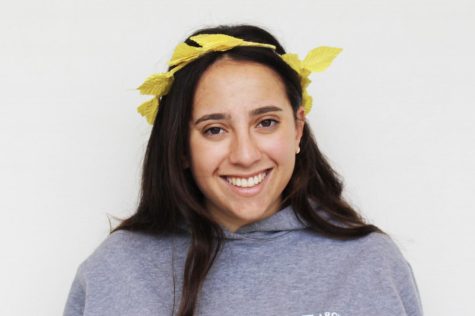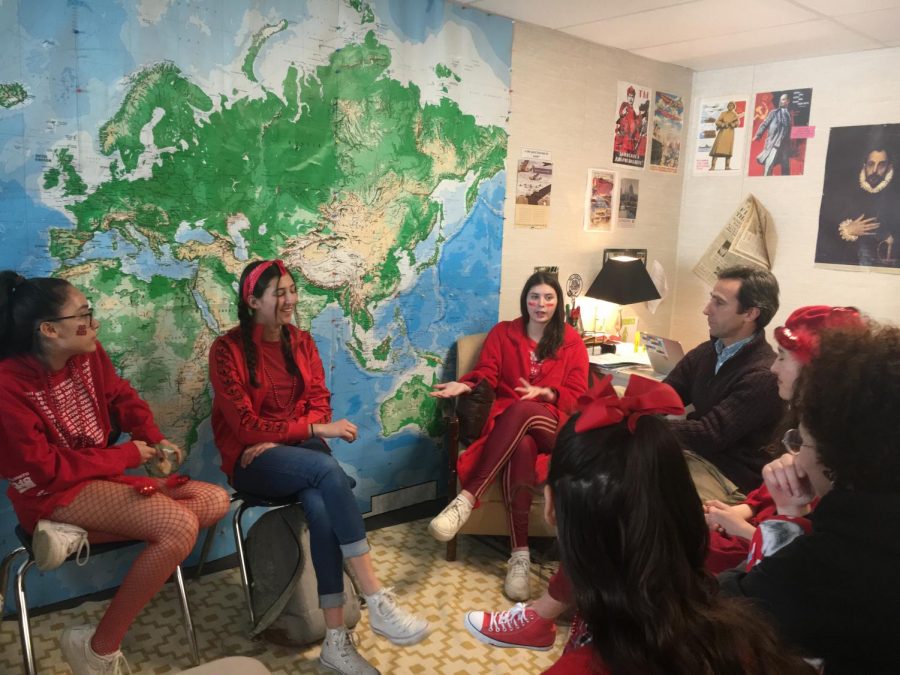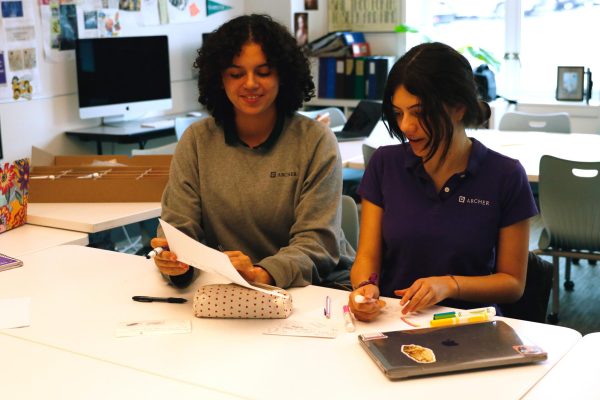Researcher Gail Dines presents about porn culture, sparks controversy
Photo credit: Anna Brodsky
Eleventh grade students debrief Gail Dines’ presentation in Nick Graham’s advisory. Dines spoke about pornography and media literacy.
Eleventh and twelfth-grade students filed into the Dining Hall during X-block on Thursday, February 21 to hear Gail Dines, a sociology professor and researcher, speak about porn and hypersexualization of the media in today’s culture. What the students did not expect was that the ideas presented in the 50-minute session would spark debate within the Archer community about the nature of sexual liberation and empowerment.
Dines is a Professor Emerita of Sociology and Women’s Studies at Wheelock College in Boston and has investigated the effects of porn for more than twenty years. She is also the CEO and president of Culture Reframed, an organization that aims to “empower participants to create positive and lasting change in families and communities harmed by the hypersexualized media and mainstream hardcore online porn that marks the digital age.”
Dines presented to the community about the impact that porn has on American culture, especially on the relationships between women and men.
“We need to be critically media literate,” Dines said in a phone interview after the presentation, “so that the images that come to us we can deconstruct and decode and figure out how they impact the way that we construct our identities as women and men.”
In an online survey sent to the junior and senior classes with 38 respondents, 47.4 percent of students said that they agreed or strongly agreed with Dines’ message, while 26.3 percent of students either disagreed or strongly disagreed. 26.3 percent were neutral.
Kat McKay was among the students who disagreed with aspects of Dines’ message. McKay, specifically, thought that it was possible for women to find empowerment in stripping.
“A lot of women take pride in being in the porn industry and being able to express themselves that way,” McKay said. “I don’t necessarily think it’s impossible.”
When asked to respond to this perspective in a phone interview, Dines linked stripping to socioeconomic status.
“That’s coming from a position of not knowing any women who strip, I presume…I get [that argument] at the more elite places. I get it more at the Ivies, private schools,” Dines said. “I don’t tend to get it from working-class women or working-class women of color because they don’t want to go anywhere near that industry, and, in fact, they’re terrified that that’s going to be their future.”
Dines noted that, as a sociologist, she aims to draw patterns within systems, which will not necessarily apply to everyone within that system.
“You’re always going to get exceptions in all social science research,” she said. “What you do is you extract from the data patterns, and then you discuss those patterns and theorize about them and go back and research them. That’s how science is built. You can’t build a social science on individual analysis.”
Malia McClurg, an Archer history teacher, noted that many Archer students initially honed in on statements they took issue with, rather than critically engaging with Dines’ perspective as a whole.
“The first conversations I heard reported back to me were only about ‘I can’t believe she said [that]’ or ‘I can’t believe she didn’t include this topic,’” McClurg said. “I don’t think the first reaction was trying to understand or ask questions. From that Thursday to Friday it felt very much fault-driven.”
However, McClurg said she noticed a shift in tone after students had processed the information, a change that made her “optimistic” about the community’s ability to engage with dialogue effectively.
“There was a little more response versus reaction, and I think there was more of a sense of trying to understand versus just simply finding fault,” she said. “Through conversations with colleagues, through multiple conversations with students, I think we have started to really unpack what Gail Dines presented. That is an important lesson — that I do think provocative, complex topics need to be unpacked.”
Junior Audrey Choate echoed this sentiment, saying that, though the presentation sparked disagreement, the dialogue was indicative of girls’ willingness to engage critically with the topic of pornography.
“A lot of Archer girls were talking about it in a really civil way [and] were discussing what she was declaring or telling us about. I think there was really healthy communication about some disagreements about what she was saying or some agreements,” she said. “I’m glad that Archer brought her because I think that it was a very formative experience for every student and every teacher. It’s really incredible that we even have the chance, as students, to talk about it, because a lot of schools [wouldn’t] give us the opportunity to speak out.”
Dines concluded the phone interview with a call for action. She believes that rather than using the term empowerment, advocates and students should “think in terms of liberation.”
“Ask what you can do with all the privilege that you have to liberate those women and girls who don’t have the same privileges,” Dines said. “That’s what it means to be human. It’s not about you. It’s not about me. It’s about how can I use my privilege and everything that has been given to me to make this world a better place for those who are not as lucky as me.”

Allie Worchell joined The Oracle writing staff in 2017. This year she is excited to be a member of the editorial board as the Voices Editor. In school,...

Anna Brodsky joined the Oracle staff in 2016. She took a hiatus for the 2017-2018 school year to fulfill her art credit by serving as copy editor for the...









